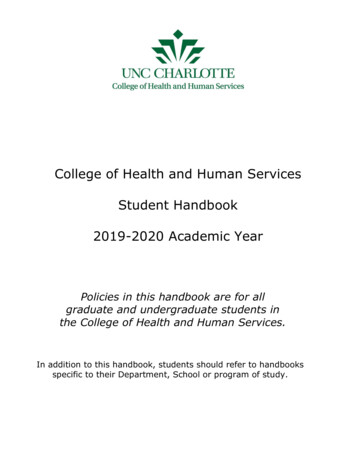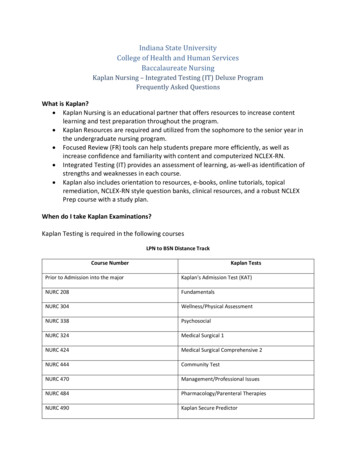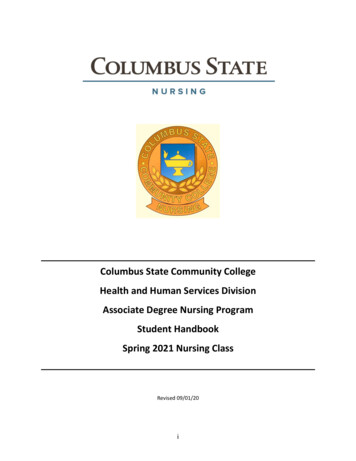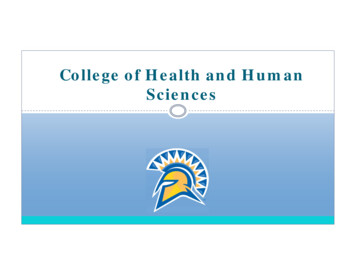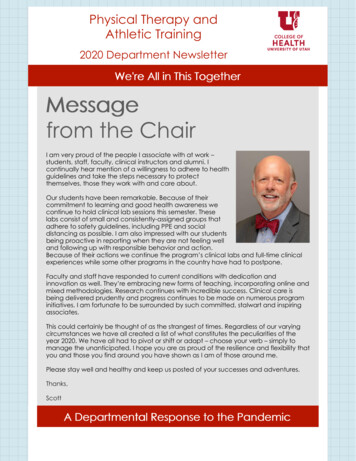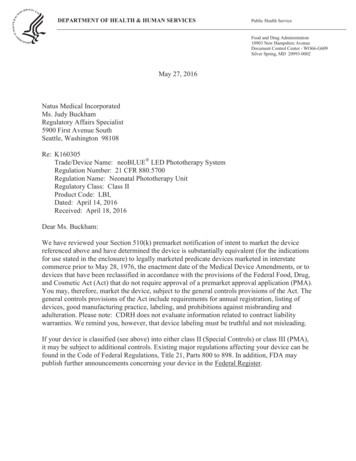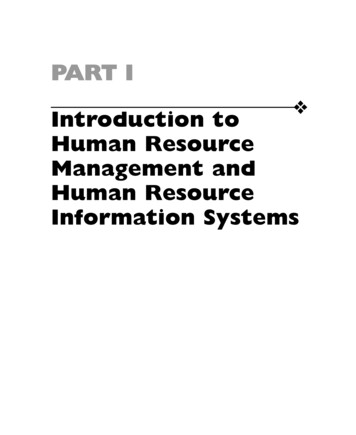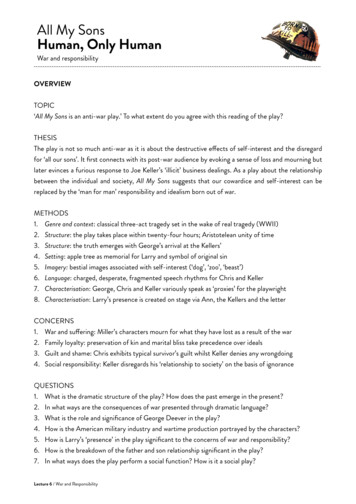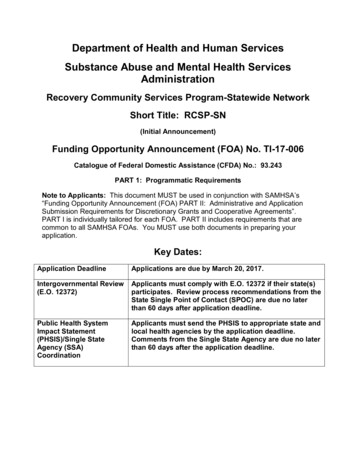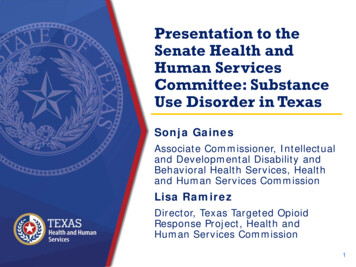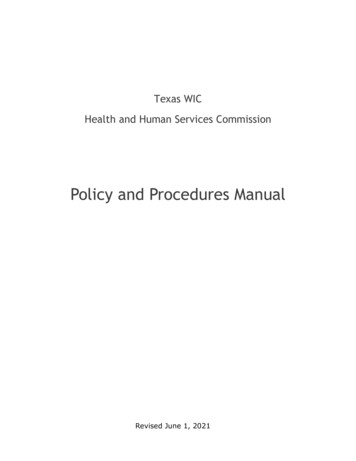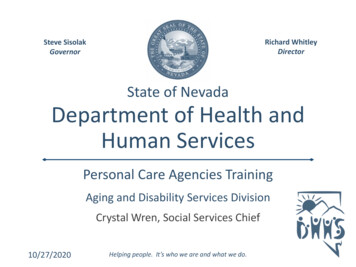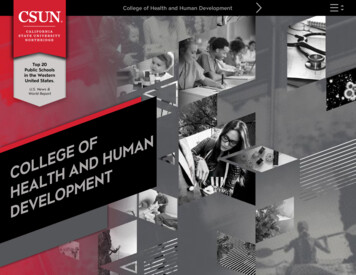
Transcription
College of Health and Human DevelopmentTop 20Public Schoolsin the WesternUnited States.U.S. News &World ReportNFAOMEUGHELDLNOACHTTNLEAMEPHOLEVDE
College of Health and Human DevelopmentTABLE OFCONTENTSCollege of Health and Human DevelopmentChild and Adolescent DevelopmentCommunication Disorders and SciencesEnvironmental and Occupational HealthFamily and Consumer SciencesHealth SciencesKinesiologyNursingPhysical TherapyRecreation and Tourism ManagementStudent InvolvementStudent Clubs and OrganizationsA Degree in Global CapitalCareers That Make a DifferenceCSUN AlumniOutstanding ValueStudents Outside CaliforniaMajors and Areas of Specialization
College of Health and Human DevelopmentC A L I F O R N I A S TAT E U N I V E R S I T Y, N O R T H R I D G ECOLLEGE OF HEALTH ANDHUMAN DEVELOPMENTMaking life better for others is the common element among our disciplines and activities in our nineacademic departments and eight community-focused centers. Health and Human Development students,faculty and professionals study well-being through research, education and action.At the undergraduate and graduate levels, we’re improving environments from the atmosphere in workplacesto the water and air quality of our planet. We’re informing personal and family development; increasingwellness; helping survivors of trauma and injury; and discovering opportunities for early intervention. We areimproving health care and enriching understanding of the roles of nutrition, physical activity and recreation.If you’re here as a student, we want you to know that we will support you through your degree program withinformed efficiency. Advising will keep you on track and open doors to mentorship opportunities as youexplore your academic life. Service learning, internships and community involvement will help you graduatewith real-world experience to take with you into your profession.We encourage diversity, curiosity, academic development, community engagement and professionalism. Theprocess of earning an academic degree is transformational, and the faculty, staff and I are excited about theopportunities you’ll find with us.— Farrell J. Webb, Ph.D.Dean, College of Health andHuman Development1OF UMANGEHLLE ANDOC LT HENTH E A E LO P MDE V
College of Health and Human DevelopmentWith over 7,000 students enrolled in the college of health and humandevelopment Like the larger campus, students in the college stem from broad points of origin. From the first-timeinternational student to the full-time midcareer professional, the college’s student body is a beacon ofglobal diversity. It is a place where passion meets purpose and where students meet the world.Healthcare is projectedto add over 4 millionjobs — a rate of 26%,by 2022—more thanany other industry. in 9 departments The college offers a superior selection of courses, methods and disciplines in nine distinct departments: Childand Adolescent Development, Communication Disorders and Sciences, Environmental and OccupationalHealth, Family and Consumer Sciences, Health Sciences, Kinesiology, Nursing, Physical Therapy andRecreation and Tourism Management. all at CSUN.At CSUN, success is no accident. It’s not an outlier or a mystery. It’s what happens when the student takespriority: success simply follows. And what better place than Los Angeles to find further success. Some ofthe greatest minds in fashion, technology, entertainment, health care and academia call the city home.And many – from astronauts to movie stars – got their start at CSUN.The journal Nature named CSUN a rising star in research in 2016. It listed the university as one of NorthAmerica’s top 25 institutions for research publications. We placed alongside Stanford, Columbia andthe University of Pennsylvania, but we stand out as California’s sole public higher education institutionto make the list.California biomedicalcompanies are projectedto attract more than 6.7 billion in venturecapital in 2018.This ranking tells you who we are and where we stand. We invite you, in the coming pages, to see what liesahead and where you can go with CSUN.2
College of Health and Human DevelopmentThe Child Life Departmentat Children’s HospitalLos Angeles offers afull-time internship whichmeets the Association ofChild Life Professionals(ACLP) requirements.Los Angeles is home toAutism Speaks Walk, theworld’s largest autismfundraising event dedicatedto improving the lives ofpeople with autism. Fundsraised in 2018 exceed 700,000 and help ensurepeople of all abilities haveaccess to the tools neededto lead “their best lives.”CHILD AND ADOLESCENTDEVELOPMENTChanging lives dailyIn the Department of Child and Adolescent Development (CADV), students learn to understand and addressthe needs of young people. Doing so means studying the theories, concepts and phenomena related to thedevelopment of individuals and social systems, with a focus on birth through adolescence.The department offers two distinct options of study: Applied Developmental Science and Early ChildhoodDevelopment. Both include curricula on the wide range of familial, biological, societal, cultural, physical,ecological, political and historical settings of human development.What’s more, CADV students benefit from the department’s many connections to leaders in the field.These partnerships, some going back decades, put students in close contact with potential mentors andfuture employers.Even before graduation, the department offers students internships and service learning experiencesat institutions such as Children’s Hospital Los Angeles and Jump Start Early Literacy.A number of scholarships are also available through the department’s alumni chapter. These include thegenerous endowment of Dr. Carol S. Kelly as well as the Nedjat Gabbaie Scholarship. Students are awardedthese scholarships based on their unique interests or qualifications. Some focus on community involvementand leadership, while others target learning disabilities or first generation college students.CADV graduates work in government, hospitals, public and private school systems, after school programs,and youth centers.3OF UMANGEHLLE ANDOC LT HENTH E A E LO P MDE V
College of Health and Human DevelopmentCOMMUNICATIONDISORDERS AND SCIENCESEducating tomorrow’s speech, language and hearing professionalsThe Department of Communication Disorders and Sciences has a three-dimensional mission of teaching,research and service for the advancement of human potential in speech, language and hearing.Students in the department study the disciplines of speech and hearing sciences, audiology and speechlanguage pathology. Courses feature both classroom instruction and experiential learning, includingparticipation in the clinical programs of CSUN’s Language, Speech and Hearing Center. This center evaluatesand treats more than 12,000 people a year who struggle with communication issues, including speech, hearingand the ability to share emotions.Of particular note is the department’s Master of Science in Communicative Disorders. This master’s degree,offered in collaboration with CSUN's Tseng College, is delivered fully online, and features practicum options atsites within each student’s community. The program received the Outstanding Achievement Award from theUniversity Professional and Continuing Education Association (UPCEA).The department also hosts an annual summer bootcamp, where current and future speech-languagepathologists explore pediatric and adult language disorders. Students at the event often forgevaluable networking relationships, which may culminate in job placements and other excitingprofessional opportunities.CSUN’s Language Speechand Hearing Centerhas served more than600,000 clients sinceopening in 1962.Diane Manzella (’72)and fellow alum Julie O.Gardner (’67) foundedGardner Manzella, Inc., oneof the first private speechpathology clinics in the U.S.In 2015, the Manzella Familyestablished an Endowmentin CommunicationDisorders and Sciencesto provide valuablesupport to students.4
College of Health and Human DevelopmentENVIRONMENTAL ANDOCCUPATIONAL HEALTHBuilding a better world, one graduate at a timeThe Department of Environmental and Occupational Health (EOH) explores the connections between theenvironment and human health. Whether it’s reducing pollution and waste, or addressing unsafe food andwater, the department drives environmental progress and promotes health, safety and sustainability.Through the “Student-toScientist Bridge Program,”Dr. Nola Kennedy, professorof environmental andoccupational health, inspiresgreater participation inoccupational health researchand prepares students foradvanced education.With well over 200 majors, the department is the largest accredited EOH program in the nation. Itshands-on approach introduces students to the field’s most important work – early and often. In appliedsettings, EOH students explore the chemical, physical and biological factors that affect human health andenvironmental quality.At CSUN’s annual Technical Symposium, for instance, EOH students join faculty and leading experts to discusstechnological solutions to Southern California’s many environmental challenges. Events like these offerstudents important inroads to the EOH community, including connections to some of the best agencies in thefield, such as the American Society of Safety Engineers, American Water Works Association and the AmericanIndustrial Hygiene Association.EOH graduates go on to a variety of professional roles, including environmental health specialists, consultantsto governments and industries, industrial hygienists, safety engineers, loss control representatives and more.5OF UMANGEHLLE ANDOC LT HENTH E A E LO P MDE V
College of Health and Human DevelopmentFAMILY ANDCONSUMER SCIENCESThe people professionIn the Department of Family and Consumer Sciences, students learn to enhance quality of life for individuals,families and communities. The scope involves everything from what we buy and what we wear to how we helpthose most in need.The department spans many fields and interests, featuring options in Apparel Design and Merchandising,Consumer Affairs, Family and Consumer Sciences Education, Family Studies, Interior Design, and Nutrition,Dietetics and Food Science.Students explore the relationships among people and their environments. They also examine the impact ofphysical, biological and social factors on human behavior and development.The department offers on-campus internships at the Klotz Student Health Center and other great universitylocations. These applied internships allow students to practice in real-world settings, alongside those alreadyin the field. They’re also an excellent opportunity to find mentors and form professional connections.For more than threedecades, the TRENDSStudent Fashion Show hasprovided students withprofessional level experiencein design, marketing andshow production.Students Rina Velascoand Michelle Sima placed1st and 3rd at the recentInternational InteriorDesign Association’sDesign Charrette.In 2016, alumna FridaHerrera, a recipient of theClinton Global Initiative'sUniversity Fellowship,organized the successfulLet's Grow Healthycommunity garden program.The program, based largelyon hands-on training Herrerareceived in the department,helps decrease childhoodobesity and promotehealthy eating habits inunderserved neighborhoods.6
College of Health and Human DevelopmentHEALTH SCIENCESThe CSUN RadiologicSciences program hasreceived the highestpossible accreditationby the Joint ReviewCommittee of Education inRadiologic Technology.Health sciences facultyDr. Salvador Esparza wasappointed in 2015 to theLos Angeles City HealthCommission to representLos Angeles’ 12th district,which includes PorterRanch, Canoga Parkand Northridge.7OF UMANGEHLLE ANDOC LT HENTH E A E LO P MDE VBETTER LIVING THROUGH BETTER CHOICESIn the Department of Health Sciences, students gain the skills and knowledge needed to promote health,prevent disease and practice in clinical settings.The department explores the health of individuals and populations, focusing on the factors that influencehuman wellness. Its programs include Health Administration, Public Health, and Radiologic Sciences.In addition to classroom activities, health sciences students get clinical experience at major health careinstitutions. At the Northridge Hospital Medical Center, for instance, students help doctors and nurses withadministrative operations, community education and other important work. Through CSUN’s Institute forCommunity Health and Wellbeing, students use education and outreach to help people and communities makebetter, more informed health care decisions.Students in these environments have an immediate impact on those they serve – from children and the elderlyto administrators, nurses and communities. Coupled with the department’s sound academic curricula, thisclinical experience can lead to successful job placements in the health care sector.
College of Health and Human DevelopmentKINESIOLOGYAt the forefront of human movementKinesiology students explore the art and science of human movement. From dance and physical educationto applied fitness studies, athletic training and exercise sciences, this department keeps people, andcareers, in motion.Community programs play a large part in kinesiology’s curricula. Designed to balance academic study with real-worldinteractions, these programs put students in touch with those seeking healthier and more active lifestyles.A good example of this is Commit To Be Fit, a community exercise program led entirely by kinesiology students. In theprogram, CSUN’s students, faculty, staff and community members engage in fun fitness and nutrition activities.CSUN boasts the newest and most comprehensive fitness facilities in the CSU system. The Student RecreationCenter (SRC), for instance, is a 138,000-square-foot, state-of-the-art facility, built for both the universityand the surrounding community. Not only is the SRC a hub of campus activity, but it ranked in the "20 MostImpressive College Gyms and Student Centers" by BestValueSchools.com.Honored by the WhiteHouse and former First LadyMichelle Obama, faculty Dr.Steven Loy’s 3 Wins Fitnessis a free, student-deliveredfitness program that servesthe local community.PhotoC S U co u rN. P tesyoh oto g r f th e Uapher: niversitSteven y StudenWetUinnionatCSUN’s Center of Achievement is another key department resource. Using both land-based and aquatic options,this center offers exercise programs to help individuals with physical disabilities. Students receive training infields related to health and rehabilitation at the center, which is also a model for other institutions to follow.Additionally, kinesiology’s dance program, which focuses on the psychophysiological effects of dancing, isrecognized as one of the top dance science tracks in the country.8
College of Health and Human DevelopmentNURSINGA LEGACY OF CARINGCSUN Nursing programparticipants have animpressive 89% passrate on the CaliforniaNational Council LicensureExamination (NCLEX).For decades, CSUN’s Department of Nursing has delivered the essential knowledge and leadership skillsneeded to succeed in the health care sector.Its innovative programs – including an RN to BSN, Accelerated Bachelor of Science in Nursing (A-BSN) and aPublic Health Nurse Certificate – are geared specifically to the needs of urban and suburban communities.All course work is tailored for the health care sector, with content covering human development, assessmentskills, theories of nursing, ethics, as well as current issues in the field.The university works with various partners in the health care industry – from major hospitals to smaller,community-based clinics – to find the right placement for each student. These opportunities prepare studentsto work in a variety of health care settings and ingrain a deep, firsthand understanding of the field’spractices and principles.Nursing graduates go on to careers as direct care providers, school nurses, public health nurses, managers,staff educators and clinical instructors in schools. Others pursue graduate degrees and become nurseanesthetists, nurse practitioners, faculty, administrators and clinical specialists.9OF UMANGEHLLE ANDOC LT HENTH E A E LO P MDE V
College of Health and Human DevelopmentPHYSICAL THERAPYHEALING THE BODY, ENRICHING THE MINDThe Department of Physical Therapy offers a doctoral program which trains students to evaluate and treatconditions resulting from injury, disease and other causes. One of three doctoral programs at CSUN, the DPTis at the forefront of physical therapy research, pedagogy and treatment. Its graduates enter the field asthought leaders, capable of guiding organizations, communities and health care professionals.There are more than240,000 licensed physicaltherapists in the UnitedStates, and the industryis expected to grow by anastounding 34% by 2024.Along with theory and research, students use evidence-based practice to meet each client’s specifictherapeutic needs. Part of meeting those needs is applying foundational sciences – anatomy, physiology,neurology and pathology – to clinical settings. The rest is the result of hands-on experience, acquired inpractical environments with actual patients.For example, at CSUN’s Physical Therapy Center for Advanced Clinical Practice, students and faculty conductresearch and perform public service. That involves, among other things, community outreach, education andtreatment. With services in everything from orthopedics to computerized motion analysis, the center’s rangeof therapeutic options are both current and extensive.Also of note is the department’s annual ECLIPSE symposium. Now in its third year, ECLIPSE focuses on stateof the art treatment and care for people with limb loss. Students and faculty from multiple CSUN departmentsattend the event, as well as alumni, community members, local support groups and people from acrossSouthern California.Each year, several CSUNphysical therapy studentsreceive scholarshipsand internships viathe Los AngelesDodgers Foundationand the Roy and RoxieCampanella Foundation.Graduates have the expertise to play vital roles in a number of settings, including outpatient clinics,rehabilitation facilities, nursing centers, schools, hospices, occupational environments, fitnesscenters and more.10
College of Health and Human DevelopmentRECREATION ANDTOURISM MANAGEMENTBE A PART OF THE ADVENTUREThe Department of Recreation and Tourism Management prepares students to enhance the quality of humanlife through recreation, leisure and play.With more than 48 million annual visitors, L.A. tourism is an 118 billion industry, supporting more than500,000 jobs in the leisure and hospitality sector. Accommodating that industry means training the nextgeneration of recreation and tourism professionals, each equipped with the skills and mindsets needed toprovide quality hospitality and leadership.The department combines traditional academic activities with experiential learning. In class, students exploreleisure and play theory, as well as event planning, leadership, management and hospitality. Out in the field,students complete practicum and internship experiences in various professional settings in the for-profit,government and nonprofit sectors.Graduates pursue numerous careers within the recreation, human services, tourism and hospitality industriesincluding positions as travel coordinators, hotel and hospitality managers, health club and spa managers,tourism destination specialists, convention coordinators, cruise ship directors, event planners, recreationalsport and entertainment facility managers, entrepreneurs and more.11OF UMANGEHLLE ANDOC LT HENTH E A E LO P MDE V
College of Health and Human DevelopmentStudent InvolvementStudent Clubs and OrganizationsWith more than 300 student clubs and organizations,as well as popular seasonal activities, such a
CALIFORNIA STATE UNIVERSITY, NORTHRIDGE. COLLEGE OF . HEALTH AND HUMAN DEVELOPMENT. Making life better for others is the common element among our disciplines and activities in our nine . academic departments and eight communit
